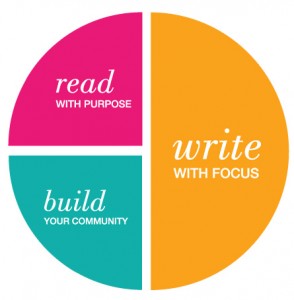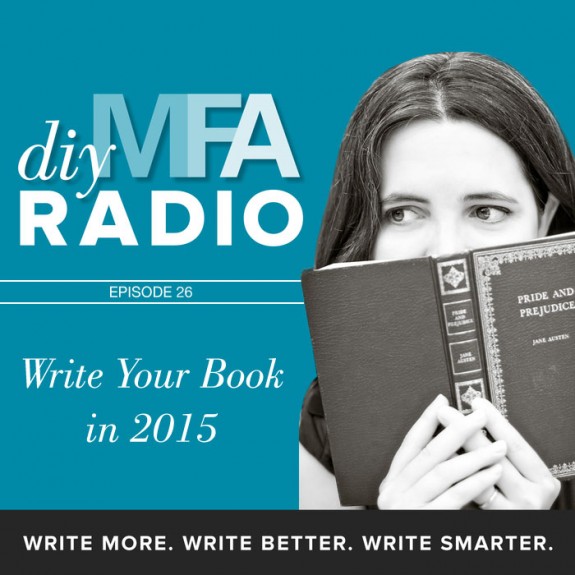Hello and thank you for joining me at DIY MFA Radio! Today I want to talk about what you need to know to write your book in 2015. We’ll discuss three myths about being a writer, as well as the the formula for rocking your writing this year. I’ll also share with you a tool that changed my writing life forever.
But first, I wanted to remind you, of something. It might seem obvious, but it’s super-important and bears repeating.
You have a story to tell, and this story is unique. Even if someone else has the same idea, they will never be able to tell that story the same way that you will. Your unique experience is what gives your writing voice it’s power.
And, your story matters. Someone out there is waiting to read it. That reader will hold your book in her hands and think: “Wow! It’s like the author was writing this just for me.” It’s your duty to write that story down and get it into the hands of your ideal readers.
Writing can be really, really hard. I know, because I do it, too. It’s hard to stick with it when the going gets tough. It’s hard coming up with new and creative ideas consistently. And it’s hard to face rejection.
But there are two things I want to make sure you remember. First, you are not alone. And second, while YES writing is hard, what no one tells you is that writing and publishing are totally doable. You CAN do this. All you have to do is tell an engaging story, find your focus, and connect with your audience.
3 Myths About Being a Writer
- If you write it, they will buy it. This is the writer’s version of “If you build it, he will come.” Don’t write to the market, but DO do your marketing homework. There’s a lot of white noise in the marketplace these days. You have to make your story stand out. You can do this by Improving your craft, and Understanding the business of writing
- You need to write a lot and read a lot. While writing 2000 words a day and reading 80 books a year might work for Stephen King, you have to find the process that works for you. You’re not going to get results by practicing someone else’s best practice.
- The MFA is a fast-track to publishing. The only thing that will get you published is sitting down and writing your book. An MFA can be helpful for some writers, but it’s certainly not for everyone. Just remember, you don’t need an MFA to tell you you’re a real writer. You’re a real writer the moment you decide to write.
3 Essential Elements of Writing
- Write with Focus
- Read with Purpose
- Build Your Community
What DIY MFA helps you do is put each of those elements together in the combination that works for you. Each part will be weighted differently depending on where you are at in your process. Find ways to factor all three components into your writing practice and then remember that they’re not set in stone. Find your unique balance.
Finally I wanted to share with you the tool that has changed my writing life forever. This tool is (drumroll please…)
Iteration
Iteration is based on the Lean Startup entrepreneurial model. The gist is this: you test ideas, tweak them, then test them again until you find something that works.
This is how you can apply iteration to your writing:
- Choose a goal. Make sure it’s measurable and concrete. Also make sure it’s not too comfortable. If it feels easy, up the goal by 10%.
- Collect data. It usually takes about 10 data points to see a pattern, so make sure you collect enough information so you can observe patterns and trends. No judging yet. At this point, you’re just collecting the data and making observations.
- Set a trip-wire (i.e. a deadline). As a rule of thumb, I usually don’t go more than 2 weeks, because that’s how long it takes to build a habit. And the last thing you want is to create a permanent bad habit.
- Analyze the data. Figure out what works and what doesn’t. Don’t get bogged down with analyzing the data. Focus on the “big picture” view.
- Decide what to do next. If it’s working, KEEP DOING IT! If it’s not working, PIVOT. Don’t overhaul your process, just tweak it and go in a slightly different direction. Remember, as you test variables, test only one at a time, or else when you have a major win you won’t know what caused it.
Iteration gives you a meta-view of your process. You’ll learn to fail better and fail faster. The faster you fail, the faster you can get to what works. Iteration is a personalized approach, targeting your specific goals. Remember, every writer is unique so you need to find the process that works for you.
If you liked this episode…
Link to Episode 26
(Right-click to download.)
Head over to iTunes, leave a review, and subscribe so you’ll be first to know when new episodes are available. Also, if you know anyone who might enjoy this podcast, please share!
Until next week, keep writing and keep being awesome.








